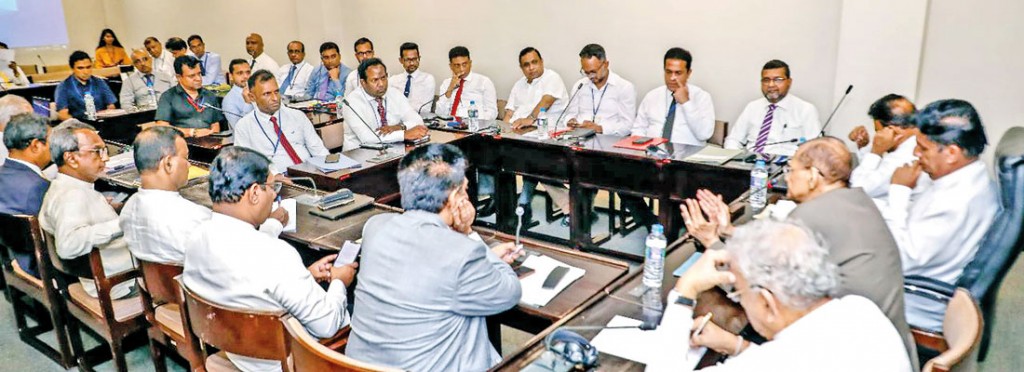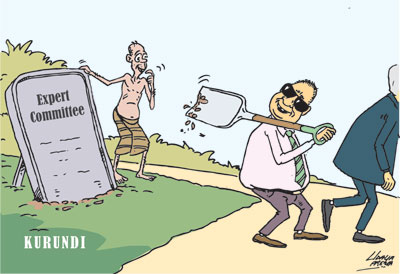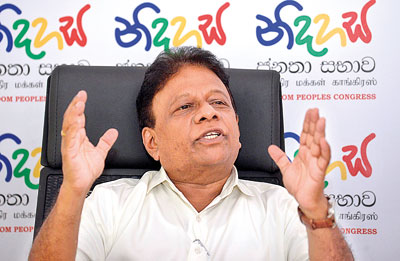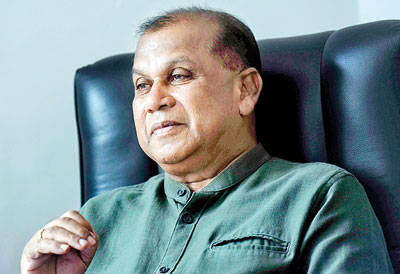Columns
- Ranil meets SLPP chiefs; stamp of approval from Basil for President’s initiatives; separate meeting with ITAK
- SJB in talks with other opposition groups to broaden its base, Madduma Bandara says Tamil and Muslim parties will be “with us”
- UNHRC sessions begin tomorrow in Geneva, Core-Group countries to put out statement on human rights violations and accountability issues
By Our Political Editor
President Ranil Wickremesinghe chaired a meeting of constituent partners of the ruling Sri Lanka Podujana Peramuna (SLPP) government he heads. For weeks now, the SLPP hierarchy has been concerned but embarrassed to speak out. On Thursday, however, the party leadership seized the opportunity to politely give vent but clothed their worries with an encouraging expression of support.
In real terms, they had little choice. As revealed in these columns last week, a one-time SLPP frontrunner, a close ally of party founder Basil Rajapaksa, was on a public relations drive to harness support for President Ranil Wickremesinghe from among his colleagues. So, Basil Rajapaksa as well as his most faithful SLPP General Secretary Sagala Kariyawasam, took part in the meeting. Rajapaksa declared that among the four presidents he had worked for,
Wickremesinghe was the best. He was always accessible, he said, but lamented mildly that was not the case with the Prime Minister. Did the Premier not heed a telephone call from him? He also heaped praise on the senior staff of the President. It is pertinent to note that for at least two presidents — Mahinda Rajapaksa and Gotabaya Rajapaksa — it was he who picked the senior staff.
More importantly, Kariyawasam referred to the President’s recent remarks at the Archaeology Director General, Professor Anura Manatunga, over the apportioning of land to the Kurundumale archaeological site. Such land issues, he humbly noted, should have been intimated to the constituent parties.
On the resignation of Manatunga, it has now come to light that a day ahead of the conference, Vidura Wickremenayake, had told senior government officials that he sought to remove him from the post. He had, in fact, forwarded the name of another SLAS official and the matter was pending. Upon his return from upcoming visits to the United Kingdom and France, President Wickremesinghe is to appoint a committee to ascertain from historical records the extent of land that remained with the Kurundumalai archaeological site. This is after his visits to the United Kingdom and France. He departed last night.
The issue has drawn protests from sections of the Buddhist clergy and former members of the SLPP government. Pivithuru Hela Urumaya Leader Udaya Gammanipila remarked that President Wickremesinghe should not have been seen to have admonished the Archaeology chief. That too at a conference with political parties that represented the north and east. He said such an act would prevent other senior officials from airing their views correctly.

The Monday meeting with SJB leader Sajith Premadasa: Oppostion party leaders discuss their political strategy to form a broad alliance to win the upcoming presidential and parliamentary elections
When the meeting was over, Basil Rajapaksa turned to the state-run media, both Sinhala and English, to declare the SLPP’s support for President Wickremesinghe. The account acknowledged that a few district-level members had not taken part in a previous meeting and assured rectification. What that pronouncement did, it is worth noting, is the SLPP founder’s stamp of approval for President Wickremesinghe. A government source, who spoke on grounds of anonymity, said, this would ensure that some 19 to 21 SLPP parliamentarians who now support Rajapaksa would back any constitutional amendment to facilitate a presidential election. As for the others, not all in his axis had to change positions. A good number have already turned backers of the UNP leader who heads the government. Some have even made public pronouncements.
Prime Minister Dinesh Gunawardena, A.L.M. Athaullah – National Congress, Minister Douglas Devananda – EPDP, Vajira Abeywardena – UNP and Jeevan Thondaman – Ceylon Workers Congress attended the meeting.
The outcome of the meeting was an expression of confidence in President Wickremesinghe. Other than that, some of the outstanding issues, like the further inclusion of some SLPPers to the Cabinet of Ministers remain. A government source said no such changes were envisaged.
SJB’s strategic partnership
The Samagi Jana Balavegaya (SJB), the main opposition party, interesting enough, is wanting to broaden its base. This is by having tie-ups with other opposition parties. “We want to work as a common opposition,” SJB General Secretary Ranjith Madduma Bandara said. He said that if a party were to secure victory, it would have to be part of an alliance. Noting that there were many alliances that secured victory, he pointed out that single parties had failed. By the time of the next elections, the SJB will include both Muslim and Tamil parties, which will be with us.
Madduma Bandara told the Sunday Times, “We are now engaged with some parties discussing the basis, but the parameters are yet to be defined. One such entity, he said, is the Freedom People’s Congress (FPC) or Nidahas Janatha Sabhawa, the grouping of 13 MPs elected to Parliament on the SLPP ticket. Its leader, Dullas Allahapperuma said, “We are in discussion with the SJB about our action plan. From our side, there is a six-member committee that is working on a manifesto and finalising this plan. If this is compatible with the SJB, we will reach an accord,” he said. Both Madduma Bandara and Alahapperuma spoke to the Sunday Times about plans for their parties and their ongoing dialogue with each other. Separate Q&As with them appear in box stories on this page.
Madduma Bandara said SJB leader Sajith Premadasa has set apart every Monday, for consultations with other opposition parties to formulate what he called a “combined common opposition.” He noted that “it is too early to even discuss the conditions for working together.” We are still in the initial stages. As for the SJB itself, he said, “We have almost completed appointing party organisers. About 80 percent of our branch associations are also complete. Samagi Vanitha Balavegayas are now being formed,” he declared.
Alahapperuma said that his group of 13 MPs will not talk either to the United National Party (UNP) or the Sri Lanka Freedom Party (SLFP). “We are totally opposed to the situation created by these two parties and have no interest in them. Nor are we interested in talking to the SLPP,” he pointed out.
It is clear from the standpoint of the FPC, which is yet to become a registered political party, that they are seeking an anchor role in a major political grouping. The idea is to make sure that their 13 members are candidates representing a formidable political side during a parliamentary election. Of course, they have already agreed to SJB leader Premadasa being their presidential candidate should they reach an accord. This is in marked contrast to July last year when Premadasa played a secondary role to Alahapperuma when Parliament voted for a President. A widely believed political deal was for Alahapperuma to be the President and Premadasa the Prime Minister if things worked their way. However, Wickremesinghe won 134 votes during the secret ballot leaving Alahapperuma with only 82.
Ahead of an election, Tamil political parties are continuing their dialogue with President Wickremesinghe to win their demands. Towards this end, Parliamentarians of the Tamil National Alliance’s (TNA) main constituent, Ilankai Thamil Arasu Katchi (ITAK), met him on Thursday, June 8. The delegation was led by ITAK President Somasundaram (Mavai) Senathirajah. The meeting was dominated by issues relating to land.
One of the contentious issues that have been discussed at several of the previous meetings was regarding a gazette notification in 2013. That was issued by the then Defence Secretary Gotabaya Rajapaksa bringing under state control some 6,000 acres of private and government land to expand the Palaly High-Security Zone. In 2015, the Yahapalanaya government released more than 3,000 acres of this land.
When it was brought to the President’s attention, he asked government officials present to examine the original notification. However, when leaving at the end of the meeting, the President shouted towards Mavai Senathirajah “When we appoint your son Senathirajah junior as the Co-ordinator for land release, the people will not blame us but him.” Whether this was a formal announcement of appointing a son of a former member of parliament from the opposition to a government position is not clear.
UNHRC sessions
begin tomorrow
It is against this backdrop that the United Nations Human Rights Council’s 53rd sessions will get underway in Geneva tomorrow (Monday). It will continue till July 14. According to diplomatic sources, the UN Human Rights High Commissioner, who is expected to make an oral statement on Sri Lanka, is due to raise concerns over what he calls the lack of progress on accountability issues in Sri Lanka.
The same sources said that at the sessions in Geneva, Sri Lanka–Core Group countries will issue a formal statement where they will also raise concerns over what they say are arbitrary arrests of persons involved in last year’s protests and alleged lack of progress on accountability for crimes committed at the end of the war and economic crimes.
On the status of the economy, whilst queues have almost disappeared, and power cuts are no more; various indicators give a bleak reading. The economy shrunk by just over 11% during the first quarter (January to March) of this year, in comparison to just over 7% contraction during the entire 2022. As the country progresses with an economic forecast, the full year (2023) predicted contraction of GDP is 2% by the Central Bank and 3% by the IMF. These predictions assume an accelerated economic revival during the next three quarters beginning from April 1. Inflation which was nearing over 70% only a few months ago, has now come down to just over 20%. The Fitch Rating Agency has downgraded the National Long-Term Ratings of the top ten Sri Lankan banks following the recent sovereign downgrade and recalibration of the agency’s Sri Lankan national rating scale. With the remaining socio-economic policy transformation approved by the IMF yet to be implemented, including cuts on public expenditure, security sector reforms, public sector transformation, privatisation of state-owned enterprises, revenue generation through further realignment of taxation and collection mechanisms, increasing of Foreign Direct Investments (FDI), etc. the road appears bumpy, to say the least.
Putting things right on the economic front continues to remain a high priority for President Wickremesinghe. Perhaps that gives time for the opposition political parties to consolidate themselves. They are no doubt encouraged by the seeming inaction of both the SLPP and the United National Party (UNP).
 Consensus on common action plan prior to forming broad alliance: Alahapperuma Consensus on common action plan prior to forming broad alliance: Alahapperuma
The leader of the group of 13 that styles itself the National People’s Congress wants a tie-up with the Samagi Jana Balavegaya. Headed by Dullas Alahapperuma, the failed candidate at the presidential poll in Parliament last July, his group is yet to be recognised as a political party. They were elected under the SLPP ticket. Here is a Q&A with Alahapperuma: Why a Freedom People’s Congress: After the Parliament voted on a President in July last year, we realised there was political dishonesty in the SLPP. We (the group of 13) decided there is no use in representing the governing party. We joined the opposition and became “independent” MPs in August last year. Though we are not a legalised political party, we decided we should have our own identity. That is how we named our group the Freedom People’s Congress or Nidahas Janatha Sabha. We hope to seek official recognition in the future. Our group is still a caterpillar. We will grow into a butterfly. Why talks with SJB even before recognition as a political party: We are working towards a political system through a “technology prioritised” ideology to create a political system that represents the new world. Looking at the protests last year, we realise that we should free ourselves from the dirty political system. People are fed up. They do not trust politicians. We want to attract the youth. We are talking to the SJB because they have some like-minded policies. Our Executive Committee has decided to form a committee of 18 members. We want to explore ways and means of getting mainstream opposition political parties together. The SJB, the National People’s Power, Tamil National Alliance, Uttara Lanka Sahabagya are among them. We want them all to agree to a common plan. We are acting as an intermediary group to get all these parties to subscribe to an action plan. What we are doing is different. This time people need to gather around an action plan. One of our representatives has been attending the weekly Monday meetings chaired by SJB leader Premadasa. Yet, it is too early to comment on any alliance with the SJB. On the need for an action plan: In 2015 an alliance to ensure the victory of then President Maithripala Sirisena was voted to power. Due to the absence of a common action plan, the government crumbled. That is why we stress the need for a common plan for all opposition political parties. We are yet to agree on an action plan with any opposition political party. Firstly, we would have to agree on a common action plan. Does the Freedom People’s Congress have an action plan: Our Executive Committee met last week. It appointed Prof. G.L. Peiris to chair a six-member committee to draft our own action plan. The same committee will also draft our manifesto. On talking to the UNP and the SLPP on the action plan: We will not have an action plan with these two parties. After all, we are finding possible solutions to the crisis created by them. Of course, members of the SLPP who are now unhappy over what is going on are welcome to join us.
| |
 SJB to form alliance of likeminded political parties: Madduma Bandara SJB to form alliance of likeminded political parties: Madduma Bandara
We want to form abroad-based common opposition to raise issues against the government, says Samagi Jana Balavegaya (SJB) General Secretary Ranjith Madduma Bandara. Here is a Q & A: The composition of the proposed common opposition: We will talk to all opposition political parties except the United National Party, the Sri Lanka Freedom Party, and the Sri Lanka Podujana Peramuna. They have contributed to the chaos in the country. Take the SLPP, which says it is the ruling party. Already there are 34 of its members sitting in opposition benches now. Must anything more be said? On talks with the Uttara Lanka Sahabagya: We have not proposed to talk to them either. This is because of the vast policy differences we have with them. We cannot agree to them. Similarly with the National People’s Power. At one time they protested private universities. They were opposed to foreign investment but are now calling for them. The NPP has taken a long time to understand reality. The search for a common opposition: Has the SJB lost confidence in winning an election on its own? Our intention is to get more than a majority of votes. We have arrived at a very crucial juncture politically. The people have rejected the SLPP. They have expressed their total displeasure at former President Gotabaya Rajapaksa though he claimed he had a mandate of 6.9 million votes. Our political history has shown that political alliances have won. Not a single political party has come to power on its own. In the last parliamentary elections, we won 54 seats. SJB support for any constitutional amendment to enable polls: A President who has the people’s mandate is empowered to call an election. However, a President who has been chosen by Parliament does not have that power. We will extend our support and even vote for constitutional amendments to facilitate an election. We know the adverse effects caused by the Constitution being amended many times. The 18th and 20th amendments removed the independent commissions and enhanced the powers of the President. Conversely, it reduced the powers of Parliament. We voted in favour of the 21st amendment. We voted in favour after the government consulted us. We do not need a new constitution. We only require refining the existing one. On why SJB leader Premadasa did not accept the Premiership: I was present at the meetings where former President Gotabaya Rajapaksa made the request to our leader to become the Prime Minister. Those of us present asked Rajapaksa to resign so our leader could assume that office. There was no response from him. Our leader did not wish to rule the country with people who bankrupted it and lost people’s favour. On whether the SJB is ready for elections: True we are busy trying to form a common opposition front. However, we are ready for any election. On the one hand, the Government claims the economy has improved. On the other, it says elections cannot be held because they do not have money. Which is the correct position, they should tell the country. |
Buying or selling electronics has never been easier with the help of Hitad.lk! We, at Hitad.lk, hear your needs and endeavour to provide you with the perfect listings of electronics; because we have listings for nearly anything! Search for your favourite electronic items for sale on Hitad.lk today!


Govt. and opposition intensify moves to strengthen their positions
View(s):